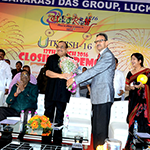Best Science College in Lucknow, UP
The application of science makes the core discipline quite strong and helps the individuals with the right tools for the research needed in terms of scientific curiosity. It potentially helps in giving out fruitful results and in turn quite beneficial for the development of humanity. The contribution to the application of sciences has been majorly through the help of best of professors, scientists as well as scholars.
Babu Banarasi Das University is providing one of the best B.Sc. (Hons.) Program in Lucknow which understands the need for science and the result that is being followed by it. As a result, BBDU has set up a very good School of Basic Sciences which has independent departments having 3 basic disciplines in it such as Chemistry, Physics, and Mathematics & Computer Science.
BBDU offers a rich bachelor honors degree in Mathematics having the most modern learning outcome based curriculum. The curriculum includes Core Courses, Discipline Specific Courses, Other Discipline Electives, Skill & Ability Enhancement Course. The high standards of teaching with hands on training makes the students ready for industry and progression to higher education as well.
Course Details
| School Name: | School of Basic Sciences |
| Course Length: | 3 Years |
| Session Start Date: | As per Academic Calendar |
| Course Type: | Full Time |
| Eligibility Criteria: | 10+2 or equivalent examination with a minimum of 50% marks in the aggregate in Science subjects with Physics, Mathematics plus one of the following: Chemistry, Statistics, Geology and Computer Science. Relaxation in qualification shall be as per UGC/State Govt. norms. |
| Programme Fee: | Rs 32,750/- Per Semester |
| Syllabus (AS 2021-22 and after) | Click here to Download |
| Syllabus As Per NEP-2020 (AS 2023-24 and after) | Click here to Download |
Program Details/FAQs
| PO(Program Outcomes) | |
|---|---|
| PO1 | Scientific Knowledge: Apply the knowledge of mathematics, computer science and various specializations to the solution of complex computational and mathematical problems. |
| PO2 | Persistent learning: Recognize the need to engage in lifelong learning through continuing education and research. |
| PO3 | Problem Analysis: To recognize, define, formulate, review literature and analyze complex mathematical and computational problems reaching substantiated conclusions using principles of mathematics, electronics and computer science. |
| PO4 | Coping with Complex Scientific problems: Maneuvering research methods including programs and experiments and analysis and design of systems. |
| PO5 | Design /Development of Solutions: Design solutions for complex computational and mathematical problems that meet the specified needs with appropriate consideration for the social and environmental consideration. |
| PO6 | Uses of Modern Tools and Techniques: An ability to design, implement, and evaluate a computational and mathematical system using latest tools and methods to meet desired needs within stipulated time boundaries. |
| PO7 | Team Work: Function in multidisciplinary teams by working cooperatively, creatively and responsibly as a member of a team. |
| PO8 | Application of Knowledge: An ability to apply knowledge of mathematics, electronics and computing appropriate to the discipline. |
| PO9 | Handling Multidisciplinary Projects: Demonstrate knowledge and understanding of scientific and computational principles and apply these to one’s own work, as a member and leader in a team. Manage projects in multidisciplinary environments. |
| PO10 | Professional Enhancement: Identifying the need for learners and enhancing the ability to engage in continuous professional development. |
| PO11 | Technological Rationality: Apply current technical concepts and practices in the core information technologies of human machine interaction, information management, applied mathematics, programming, networking, and web systems and technologies. |
| PO12 | Ethics: Apply ethical principles and commit to professional ethics and responsibilities and norms of the scientific practice. |
| PSO (Program Specific Outcomes) | |
|---|---|
| PSO1 | Apply the mathematical complex solutions based on scientific/mathematical principles for the analysis and interpretation of mathematical problems. |
| PSO2 | Inculcate, develop and implement ethical principles and responsibilities of a mathematician to serve the society and have necessary skills and expertise in the field of research and developments through seminar and dissertation. |
School Notice
School of Education performs a significant function of providing learning experiences and lead the students from darkness of ignorance to light of knowledge. Teacher is the most important element in any educational program. It is the teacher who is instrumental in implementation of the educational process at any stage. It is imperative to invest in the preparation of teachers, so that the future of a nation is secure. It is well known that the quality and extent of learner achievement are determined primarily by teacher competence, sensitivity and teacher motivation.
Aims of school of Education
The School of Education endeavours to:
- Promote academic excellence and strive to provide quality education.
- Prepare futuristic teachers with global vision.
- It aims at building a community of teachers and teacher educators possessing a sound theoretical base in the discipline of Education, an ability to analytically examine and evaluate the knowledge acquired and apply the same in their respective fields.
- Develop a research orientation among students, teachers, and teacher educators, train them in research methodology; develop skills for conducting and guiding research and facilitating the dissemination of research findings among the researchers in education.
- Reach out to other Educational Institutions in the areas of Teaching Technologies, Research Methodology in Social Sciences and Education Management.
- Conduct and guide research in the field of Education.
Course Details
| School Name: | School of Education |
|---|---|
| Duration of Course: | 2 Years |
| Session Start: | August |
| Number of Seats: | Total intake of B.Ed. course in the School of Education, BBD University shall be 100 or as decided by NCTE from time to time. |
| Course Type: | Full Time |
| Eligibility Criteria: | Candidates with at least 50 % marks either in the Bachelor’s degree and/or in the Master’s degree in Sciences/ Social Sciences/ Humanities/Commerce or Bachelor’s in Engineering or Technology with specialization in Science and Mathematics with 55% marks or any other qualification equivalent thereto, are eligible for admission to the programme. The reservation and relaxation for SC/ST/OBC/ PWD and other categories shall be as per the rules of the central government/ state government, whichever is applicable. |
| Programme Fee: | 30,350 1st Semesters 30,350 2nd Semesters 30,350 3rd Semesters 30,350 4th Semesters |
Key Highlights
- Lecture rooms of the department have various course classes. Availability of conference room, well equipped with smart class rooms, LCD projectors, OHPs and white boards.
- The Department has collaborative programmes with other Schools and Colleges for academia association and increasing employability.
Career Options in Education Field
- Teacher in Schools: Government & Private
- Principal in Schools: Government & Private
- Education Administrators :Government & Private
- Policy Makers in Government Sector
- Researchers
- Content/module developer
- Instructional designer
- Project Associate in NGO
- Counselors
| Programme Outcomes (POs) | |
|---|---|
| PO1 | To imbibe the knowledge and develop understanding of various methods and approaches of organizing learning experiences of Secondary school students. |
| PO2 | To Systematize experiences and strengthen the professional competency of Pupil Teachers. |
| PO3 | To develop skills required in selecting, organizing and experiences. |
| PO4 | To Design/ construct micro and macro plans with appropriate consideration of understanding level of the students. |
| PO5 | To develop skills involved in dealing with the academic and personal problems of learners. |
| PO6 | To acquire knowledge and develop understanding about the various methods and techniques of evaluation. |
| PO7 | To develop skills involved in selecting, developing and using evaluation tools for pupil teachers. |
| PO8 | To provide knowledge and develop understanding about various aspects of school management. |
| PO9 | To develop competencies for organizing various instructional and student co- curricular activities. |
| PO10 | To function individually and in team work with creativity |
| PO11 | To apply ethical principles, professional skills and responsibilities of the pupil Teacher. |
| PO12 | To Use updated and modern tools, online resources and audio visuals based on ICT. |
| Program Specific Outcomes (PSO) | |
| PSO1 | To Understand basic concepts and ideas of educational theory. Build understanding and prospective on the nature of the learner diversity and learning. Comprehend the role of the system of Governance and structural –Functional provisions that support school education. |
| PSO2 | To Develop understanding about teaching, pedagogy school management and community involvement. Build Skills & ability of communication reflection art, aesthetics, theatre, self-expression and ICT |













